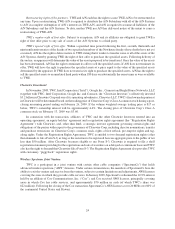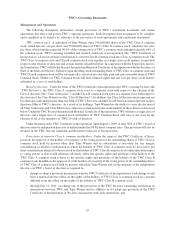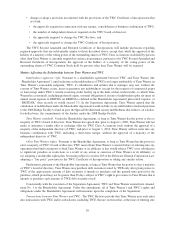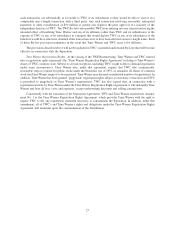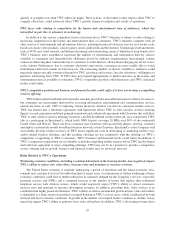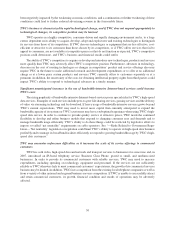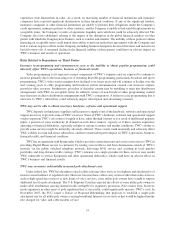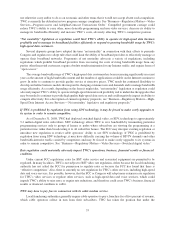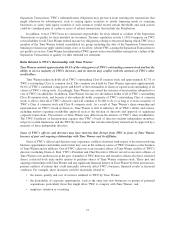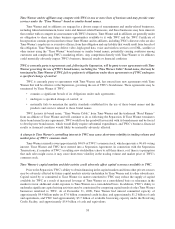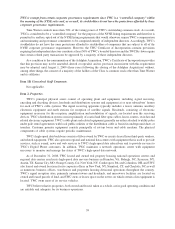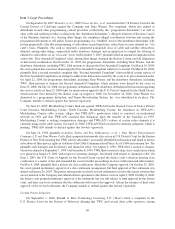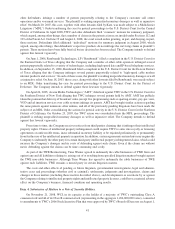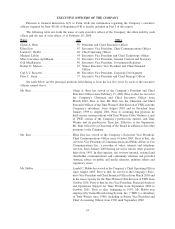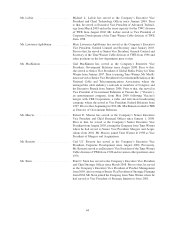Time Warner Cable 2008 Annual Report Download - page 44
Download and view the complete annual report
Please find page 44 of the 2008 Time Warner Cable annual report below. You can navigate through the pages in the report by either clicking on the pages listed below, or by using the keyword search tool below to find specific information within the annual report.Some of the poles TWC uses are exempt from federal regulation because they are owned by utility
cooperatives and municipal entities. These entities may not renew TWC’s existing agreements when they expire,
and they may require TWC to pay substantially increased fees. A number of these entities are currently seeking to
impose substantial rate increases. Any inability to secure continued pole attachment agreements with these
cooperatives or municipal utilities on commercially reasonable terms could cause TWC’s business, financial results
or financial condition to suffer.
Risks Related to Government Regulation
TWC’s business is subject to extensive governmental regulation, which could adversely affect its business.
TWC’s video and voice services are subject to extensive regulation at the federal, state, and local levels. In
addition, the federal government has extended some regulation to high-speed data services and is considering
additional regulations. TWC is also subject to regulation of its video services relating to rates, equipment,
technologies, programming, levels and types of services, taxes and other charges. Modification to existing
regulations or the imposition of new regulations could have an adverse impact on TWC’s services. If the Congress
or regulators were to disallow the use of certain technologies TWC uses today or to mandate the implementation of
other technologies, TWC’s services and results of operations could suffer. TWC expects that legislative enactments,
court actions, and regulatory proceedings will continue to clarify and, in some cases, change the rights of cable
companies and other entities providing video, high-speed data and voice services under the Communications Act
and other laws, possibly in ways that TWC has not foreseen. The results of these legislative, judicial, and
administrative actions may materially affect TWC’s business operations in areas such as:
•Voice Communications. Traditional providers of voice services generally are subject to significant state
and federal regulations. It is unclear to what extent certain of those regulations (or other regulations) apply
to certain providers of interconnected voice-over IP services, including TWC’s. In orders over the past
several years, the FCC subjected voice-over IP providers to a number of regulatory obligations applicable
to traditional voice service. To the extent that the FCC, Congress or individual states impose additional
burdens, TWC’s operations could be adversely affected. See “Business—Regulatory Matters—Voice
Services.”
•Phantom Signals. In May 2008, the U.S. Copyright Office (the “Copyright Office”) published an order
stating its view that where cable operators carry a distant station in any portion of a “cable system” as
defined in the Copyright Act of 1976, basic service revenues from all portions of such system where such
station would be distant must be used to compute copyright compulsory license royalties, even if the station
is not actually carried in such areas. The Copyright Office’s reading of the relevant law could significantly
increase the Company’s costs of carrying “distant” television stations.
Changes in broadcast carriage regulations could impose significant additional costs on TWC.
Although TWC would likely choose to carry the majority of primary feeds of full power stations voluntarily,
so-called “must carry” rules require TWC to carry some local broadcast television signals on some of its cable
systems that it might not otherwise carry. If the FCC seeks to revise or expand the “must carry” rules, such as to
require carriage of multicast streams, TWC would be forced to carry video programming that it would not otherwise
carry and potentially to drop other, more popular programming in order to free capacity for the required
programming, which could make TWC less competitive. Moreover, if the FCC adopts rules that are not com-
petitively neutral, cable operators could be placed at a disadvantage versus other multi-channel video providers.
Under the program carriage rules, TWC could be compelled to carry programming services that it would not
otherwise carry.
The Communications Act and the FCC’s “program carriage” rules restrict cable operators and MVPDs from
unreasonably restraining the ability of an unaffiliated programming vendor to compete fairly by discriminating
against the programming vendor on the basis of its non-affiliation in the selection, terms or conditions for carriage.
The FCC’s Adelphia/Comcast Transactions Order imposes certain additional obligations related to these rules.
Under a successful program carriage complaint, TWC might be compelled to carry programming services it would
34


